 MyDogBreeds
MyDogBreedsSerbian Mountain Hound is originated from Serbia but Ariege Pointer is originated from France. Serbian Mountain Hound may grow 17 cm / 6 inches shorter than Ariege Pointer. Serbian Mountain Hound may weigh 8 kg / 17 pounds lesser than Ariege Pointer. Serbian Mountain Hound may live 3 years less than Ariege Pointer. Both Serbian Mountain Hound and Ariege Pointer has same litter size. Both Serbian Mountain Hound and Ariege Pointer requires Low maintenance.
Known as the Srpski Planinski Gonic dog and coming from Yugoslavia, the Serbian Mountain Hound is one of two modern hounds that was once known as the Yugoslavian Mountain Hound or Jugoslovenski Planinski Gonic.
There isn't much information on the origins of the dogs. These two dogs are considered similar breeds, only varying in region. Its a hunting dog thought to have descended from Asian search dogs.
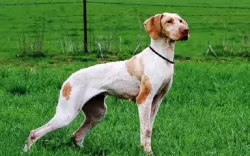 The Ariege Pointer is a French hunting dog, coming from the Ariegeois region of France.
The Ariege Pointer is a French hunting dog, coming from the Ariegeois region of France.
Known as the Ariege Pointing Dog, French Pointer or Braque de l’Ariege, these dogs came from the old French Braque dogs that were crossed with the orange and white Southern Braques.
It was in 1990 that a team of breeders decided to devote themselves to the breed’s survival. The Braque de l’Ariege was recognized by the United Kennel Club in 2006.
The Serbian Mountain Hound is about 46 to 50cm in height and weighs around 18 to 22 kilograms. This Yugoslavian hound breed has been used in Serbia as a hunting dog and they are thought to be rare outside of Serbia.
The coat of the newer Mountain Hound is fairly short and thick and mainly black with some tan marks around the paws and muzzle. The dog has floppy ears and a long tail.
This is a hardy scent hound that is confident and bold. They are used to hunting on rough terrain in the Balkan region. They are independent dogs and training and socialization will refine them, making the dog obedient and well mannered.
When he isn’t outdoors, he becomes a good-natured, gentle amiable dog that is good with children in the home.
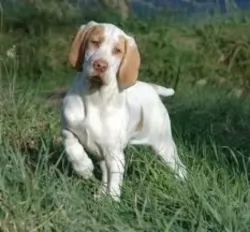 The Ariege Pointer has always been a dog kept essentially for hunting and not as a companion dog. He stands between 55 – 67cm and weighs 25 – 30kg.
The Ariege Pointer has always been a dog kept essentially for hunting and not as a companion dog. He stands between 55 – 67cm and weighs 25 – 30kg.
He is an attractive looking dog with quite a large head while the body is sleek and slender to look at. The ears are quite large and are floppy while the tail is traditionally docked to give him that distinctive look. These days the tail is often left long and hangs downwards.
The coat is short, single and rough and is white with tan or orange patches. The coat can also be speckled or ticked.
The Ariege Pointer is a hunting dog who is friendly towards strangers and therefore won’t make a particularly good watchdog.
These dog are lively, independent and good natured and they make excellent companion dogs. They are fairly docile and and get on well with children and pets in the home. Just like with any other dog, they need to be trained and socialized early.
The Serbian Mountain Hound is such a social, happy, friendly kind of dog that he makes a wonderful family pet.
He learns well, he likes to please, he gets on well with children and dogs in the home, he is independent and not a noisy barker. He is also fairly low maintenance.
Take good care of him and you’re guaranteed to have a wonderful pet and companion.
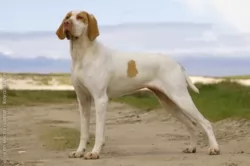 The Ariege Pointer has always been an excellent pointing- and hunting dog. When it comes to being a family pet, he puts his hunting skills aside and becomes a loyal, loving, friendly pet.
The Ariege Pointer has always been an excellent pointing- and hunting dog. When it comes to being a family pet, he puts his hunting skills aside and becomes a loyal, loving, friendly pet.
They are considered to be rare dogs, and were at one time bordering on extinction. Those who have owned one of these hunting dogs will be glad to know that they are no longer considered endangered. They’re not your friendly, social kind of dog that you find in other dog breeds, but with training and socialization he will make a fine companion and family friend.
Nobody wants their dog to be sick and lethargic, after all they are our best friend’s. Some ways to check the status of your dog’s health -
Check his breath, as a bad breath, just like as with a human being, can be a sign of illness. It can also be indicative of dental problems, digestive or kidney problems.
Spread his fur and check that the skin is a healthy color – pink, grey or black. Make sure there is no crusting or itching with red, inflamed areas. Make sure the coat is thick and lustrous – not falling out and thinning.
Make sure the nails aren’t split, flaking and broken and that the paws aren’t cut so that the dog is constantly licking them.
Every dog drinks a lot of water after hectic exercise, but if your dog suddenly becomes very thirsty more than usual, it could be indicating a medical problem, and you will need to discuss it with your vet.
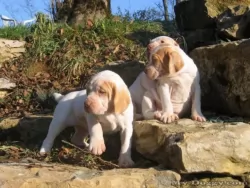 The Ariege Pointer is a working dog breed, used for hunting and retrieving prey. With good care the dog can live to be a good 12 – 15 years of age.
The Ariege Pointer is a working dog breed, used for hunting and retrieving prey. With good care the dog can live to be a good 12 – 15 years of age.
However, with every dog breed there are common dog diseases to watch for. This dog has long floppy ears and these can get damp and will need to be cleaned and dried regularly otherwise the long ears can be prone to infection.
Apart from being prone to health issues such as an ear infection, you want to be aware of very common dog ailments such as hip dysplasia which can cause lameness in your dog.
Whatever illness your dog has, and you see he isn’t acting his usual self, get him to the vet for a check-up and then make sure that all treatment and medication prescribed is adhered to.
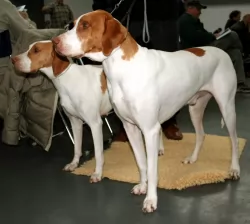 Your attractive Ariege Pointer will give birth to 2 – 8 puppies. If you don’t want puppies, then spaying or neutering is excellent and can actually have many health benefits for your pet.
Your attractive Ariege Pointer will give birth to 2 – 8 puppies. If you don’t want puppies, then spaying or neutering is excellent and can actually have many health benefits for your pet.
This dog with its short coat requires very little maintenance, and a good brush twice a week will ensure the coat remains glossy and shiny, giving you the chance to also check for fleas and ticks.
Don’t just assume every dog has bad breath. Bad breath can be indicative of dental disease, and dental problems can cause all kinds of other illnesses within the body. Make sure that while your pet’s teeth are healthy, that you brush them 2 or 3 times a week with special canine toothbrush and toothpaste.
The Ariege Pointer requires regular exercise as it is a lively, energetic dog. He can adapt to life in the city or the country, but ideally he needs a place with a large garden.
Wherever you keep him as a pet, make sure you take him for walks every day and that you play ball- or rope games with him. Ignoring his exercise needs will turn him into a bored, frustrated pet, and that isn’t fair towards him.
Make sure you choose good quality commercially manufactured foods for him. Adding in some home-made food to his kibble such as cooked brown rice, vegetables and chicken will be wonderfully good for him.
Every dog will require some raw meat added into his diet from time to time. Many skin diseases can be treated by adding in raw meat. After all, before dogs were domesticated they lived on raw meat, and including this ingredient back into their diet guarantees to make a remarkable difference in terms of good health.